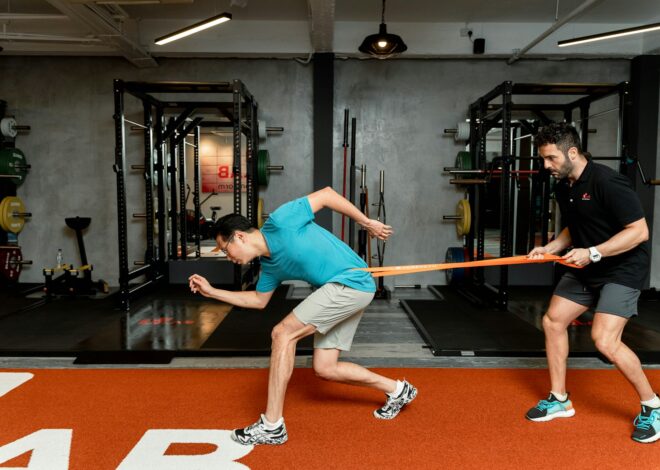
The Top 5 Mistakes to Avoid When Starting Your Fitness Journey
Setting Unrealistic Goals
Setting unrealistic goals in your fitness journey can lead to frustration and disappointment. When you set goals that are too ambitious or unattainable within a reasonable timeframe, you may find yourself feeling overwhelmed and demotivated. It’s important to set goals that are challenging yet realistic, allowing you to progress at a pace that is sustainable for you.
By setting realistic goals, you can build confidence and momentum as you achieve each milestone along the way. Instead of aiming for drastic changes overnight, focus on setting small, achievable goals that align with your abilities and current fitness level. This approach will not only keep you motivated but also prevent burnout and setbacks in your fitness journey.

Skipping Warm-Up and Cool Down
Skipping warm-up and cool down can significantly increase your risk of injury during exercise. Warm-up exercises prepare your body for the upcoming workout by gradually increasing your heart rate and loosening your muscles. This helps improve flexibility and range of motion, making your workout more effective and safer. On the other hand, cool down exercises help your body return to its resting state by gradually lowering your heart rate and reducing muscle soreness. Skipping these important components of your fitness routine can lead to muscle strains, joint injuries, and overall discomfort post-workout.
Taking the extra time to properly warm up and cool down may seem insignificant, but it plays a crucial role in your overall fitness journey. By incorporating these simple steps into your routine, you are not only reducing the risk of injuries but also aiding your body in recovery and improving your performance in the long run. Remember, a few extra minutes dedicated to warming up and cooling down can make a world of difference in your fitness progress and overall well-being.

Not Listening to Your Body
Ignoring the signals that your body is sending can lead to injury and burnout. Pushing through pain or discomfort without addressing the underlying issue can worsen the problem and hinder your progress in the long run. It’s essential to tune in to what your body is telling you during workouts, whether it’s a twinge in your knee, tightness in your muscles, or fatigue that feels more than just normal exertion.
Your body has a way of communicating with you, and it’s crucial to pay attention and adjust your workout accordingly. This might mean taking a lighter day, incorporating more rest, or seeking professional advice to address any persistent issues. By listening to your body and respecting its limits, you can prevent setbacks and sustain a healthy and balanced approach to your fitness journey.
Comparing Yourself to Others
Constantly comparing yourself to others in the gym can be detrimental to your progress and mental well-being. It’s easy to get caught up in observing how much weight someone else is lifting or how long they can run on the treadmill. However, everyone’s fitness journey is unique, and what works for someone else may not necessarily work for you.
Instead of fixating on others, focus on your own goals and achievements. Celebrate your own progress and milestones, no matter how small they may seem in comparison to someone else’s. Remember that fitness is a personal journey, and the only person you should be competing against is yourself. By shifting your mindset away from comparison and towards self-improvement, you’ll find greater satisfaction and motivation in your workouts.

Not Seeking Professional Guidance
Seeking professional guidance when embarking on a fitness journey is a crucial step that many individuals overlook. A qualified fitness expert can provide invaluable advice tailored to your specific goals, abilities, and limitations. They can help you create a personalized workout plan, teach you proper exercise techniques to prevent injuries, and offer motivation and support along the way. Without professional guidance, you may be at risk of following ineffective or unsafe training methods that could hinder your progress and put your health at risk.
Furthermore, a fitness professional can also help you navigate any challenges or plateaus you may encounter, adjusting your program as needed to keep you on track towards reaching your goals. Their expertise can make a significant difference in the efficiency and effectiveness of your workouts, ultimately leading to better results in a safer and more sustainable manner. By seeking out professional guidance, you are investing in your long-term success and well-being in the realm of fitness.

Ignoring Proper Nutrition
Proper nutrition is a key component of any fitness regimen. Fueling your body with the right balance of nutrients is essential for optimal performance and recovery. Ignoring the importance of proper nutrition can hinder your progress and leave you feeling fatigued and unmotivated.
A diet lacking in essential vitamins, minerals, and macronutrients can lead to muscle fatigue, decreased energy levels, and slower results in your fitness journey. It’s crucial to pay attention to what you eat, ensuring you are getting enough protein, carbohydrates, healthy fats, and a variety of fruits and vegetables to support your overall health and fitness goals.

Overtraining
Overtraining occurs when individuals push their bodies beyond their limits, often in pursuit of faster results or performance gains. It can lead to physical and mental exhaustion, increased risk of injury, and a plateau in progress. Despite the desire to push harder and do more, it is important to recognize the signs of overtraining, such as persistent fatigue, decreased performance, and an increased resting heart rate.
Listening to your body and incorporating adequate rest and recovery into your routine is crucial in preventing overtraining. Building in regular rest days, varying your training intensity, and prioritizing quality over quantity can help maintain a healthy balance. Remember, progress is a result of consistent effort and proper recovery, not constant strain and exhaustion.

Lack of Consistency
Consistency is key in any fitness journey. Without it, progress can be hindered and goals may seem unattainable. When you are inconsistent with your workouts, your body doesn’t have the opportunity to adapt and improve. It’s like taking one step forward and two steps back, making it challenging to see sustainable results.
Additionally, lack of consistency can lead to feelings of frustration and demotivation. When you are not sticking to a regular exercise routine, it’s easy to lose sight of your goals and feel like you’re not making any progress. This can create a cycle of negativity that further hinders your fitness journey.

Focusing Only on Cardio
Cardiovascular exercise is undoubtedly crucial for overall health and fitness, but solely focusing on cardio can lead to imbalances in your workout routine. While cardio workouts are fantastic for improving heart health and burning calories, neglecting other forms of exercise, such as strength training, can limit your progress. Incorporating strength training into your fitness regimen not only helps build muscle and increase metabolism but also enhances cardiovascular performance.
By incorporating a mix of cardio and strength training, you can create a well-rounded workout routine that targets different muscle groups and energy systems. Additionally, strength training plays a significant role in injury prevention by strengthening muscles and supporting joints. Remember that a balanced approach to exercise is key to achieving optimal results and maintaining a healthy, functional body in the long run.

Not Incorporating Strength Training
Strength training is an essential component of a well-rounded fitness routine. Incorporating exercises like weightlifting, bodyweight movements, and resistance band workouts can help improve muscle mass, bone density, and overall strength. Neglecting to include strength training in your workouts can limit your progress and hinder your ability to reach your fitness goals.
In addition to its physical benefits, strength training also offers numerous mental health advantages. Engaging in resistance training can boost your confidence, enhance your mood, and reduce stress levels. By incorporating strength training into your exercise regimen, you can experience a holistic approach to fitness that not only benefits your body but also supports your mental well-being.

Neglecting Recovery Time
Neglecting recovery time after intense physical activity is a common mistake that many individuals make. Failing to allow your body sufficient time to rest and recuperate can lead to overtraining, increased risk of injury, and hindered performance. Recovery time is crucial for muscle repair, replenishing energy stores, and overall physical and mental rejuvenation.
Without proper recovery, the body is unable to adapt to the stress of exercise, which can result in decreased strength gains and stalled progress. It is important to listen to your body and give it the time it needs to recover in order to see long-term improvements in your fitness journey. Remember, recovery is just as important as the workout itself, so prioritizing rest and recovery should be an integral part of your fitness routine.
Not Tracking Progress
Keeping track of your progress is crucial when it comes to achieving your fitness goals. By monitoring your workouts, weights lifted, distances ran, or any other relevant metrics, you can not only see how far you’ve come but also identify areas for improvement. Without this vital information, it’s easy to feel like you’re not making any advancements, which can lead to frustration and demotivation.
Recording your progress doesn’t have to be complicated – a simple fitness journal or app can do the trick. By consistently logging your exercises and noting any changes in your performance, you’ll have a clear picture of your development over time. This not only helps you stay motivated but also allows you to make informed decisions about adjusting your workouts to better align with your goals.
Ignoring Proper Form
When it comes to working out, one common mistake that many people make is ignoring proper form. Proper form is crucial in ensuring that you are targeting the right muscles and reducing the risk of injuries. Focusing on executing each exercise with proper form not only maximizes its effectiveness but also prevents unnecessary strain on your body.
Ignoring proper form can lead to muscle imbalances, joint pain, and decreased results from your workouts. It is important to prioritize quality over quantity when it comes to exercise. Taking the time to learn and master the correct form for each movement will not only improve your strength and flexibility but also contribute to your overall fitness progress in the long run.
Not Hydrating Enough
Staying adequately hydrated is essential for overall health and optimal exercise performance. Dehydration can lead to fatigue, cramping, and decreased endurance during physical activity. It’s crucial to listen to your body’s cues for thirst and replenish fluids regularly throughout the day, especially before, during, and after workouts.
Water is a vital component to help regulate body temperature, transport nutrients, and remove waste products. Not hydrating enough can hinder these processes, leading to decreased workout efficiency and an increased risk of injuries. To ensure you’re staying hydrated, aim to drink water consistently throughout the day and pay attention to signs of dehydration such as dark urine or feelings of thirst.
Skipping Rest Days
Rest days are an essential component of any effective workout routine. When you skip rest days, you deny your body the crucial time it needs to recover and repair itself. Pushing yourself too hard without allowing for adequate rest can lead to burnout, injuries, and decreased performance in the long run.
Overtraining due to the omission of rest days can also have a negative impact on your mental well-being. Physical exhaustion and constant strain on your body can increase stress levels and diminish the enjoyment you derive from exercise. Remember, rest days are not a sign of weakness but rather a strategic decision to allow your body to recuperate and come back stronger.
Not Getting Enough Sleep
Adequate sleep is often overlooked but plays a crucial role in overall health and fitness. When you don’t get enough sleep, your body doesn’t have the necessary time to recover and repair itself from the day’s activities. This can lead to decreased performance during workouts, hindered muscle recovery, and increased risk of injuries.
Moreover, sleep deprivation can disrupt hormone levels, particularly those related to appetite regulation and stress management. This imbalance can result in unhealthy cravings, overeating, and higher levels of stress, all of which can sabotage your fitness goals. Prioritizing quality sleep is essential for allowing your body to function optimally, supporting your physical and mental well-being.
Relying Too Much on Supplements
Relying excessively on supplements in hopes of achieving fitness goals can be a common pitfall among individuals seeking quick results. While supplements can complement a well-rounded exercise routine and balanced diet, they should not be seen as a substitute for holistic health practices. Depending solely on supplements without addressing fundamental aspects of fitness, such as proper nutrition and consistent training, may impede long-term progress and overall well-being.
Supplements are intended to supplement your existing routine, not replace essential components of a healthy lifestyle. Prioritizing a varied diet rich in nutrients, along with regular exercise, will provide a strong foundation for fitness success. Rather than solely relying on supplements, focus on creating sustainable habits that promote overall health and longevity.

Ignoring Mental Health
Ignoring mental health in your fitness journey can have detrimental effects on both your physical and emotional well-being. Many individuals underestimate the impact of stress, anxiety, and other mental health issues on their ability to reach their fitness goals. Focusing solely on the physical aspect of training while neglecting mental health can lead to burnout, lack of motivation, and overall dissatisfaction with your progress.
It is essential to pay attention to your mental state throughout your fitness journey. Incorporating stress-reducing activities such as meditation, yoga, or simply taking time to relax can significantly improve your overall well-being and enhance your performance in your workouts. Remember that mental health is just as important as physical health when it comes to achieving your fitness goals.

Lack of Patience
Impatience can be a common stumbling block on the path to achieving fitness goals. Many individuals expect immediate results and become frustrated when progress seems slow. It’s essential to understand that fitness is a journey that requires time, dedication, and consistency.
Rushing the process can lead to burnout, injury, or giving up altogether. It’s important to embrace the journey and celebrate small victories along the way. By understanding that sustainable progress takes time, individuals can stay motivated and committed to their fitness journey in the long run.
Not Enjoying the Process.
Many individuals embark on their fitness journey with the sole focus on reaching a specific end goal, such as losing a certain amount of weight or achieving a particular level of strength. However, the process of working towards these goals is just as important as the end result itself. When individuals fail to find joy and satisfaction in the daily grind of their fitness routine, they are more likely to become demotivated and ultimately give up on their goals altogether.
Instead of viewing exercise as a chore or a means to an end, it is essential to shift your mindset and learn to appreciate the journey. Embrace the small victories, celebrate your progress no matter how incremental it may seem, and find ways to make your workouts enjoyable. Whether it’s trying out new exercises, participating in group classes, or spending time in nature while being active, finding ways to infuse fun and excitement into your fitness routine can make a significant difference in your overall mindset and long-term success.
• Embrace the small victories along the way
• Celebrate progress no matter how incremental it may seem
• Find ways to make workouts enjoyable and fun
• Try out new exercises to keep things interesting
• Participate in group classes for added motivation
• Spend time in nature while being active for a change of scenery













